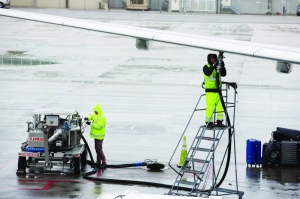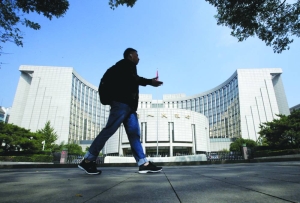Timing delicate to slap extra tax on jet fuel on emission concerns


Ground operations employees fuel a plane. European Union countries are considering delaying the introduction of EU-wide taxes on polluting aviation fuels for 20 years, as they seek a breakthrough on tax reforms that have been negotiated for years with little progress.
The European Commission proposed an overhaul of energy tax rules in 2021 to make them more climate-friendly, including by gradually introducing taxes on fuels for flights within the 27-nation bloc, which currently escape EU-wide levies.
European Union countries are considering delaying the introduction of EU-wide taxes on polluting aviation fuels for 20 years, as they seek a breakthrough on tax reforms that have been negotiated for years with little progress, a recent Reuters’ dispatch showed.
Levying a tax on jet fuel due to pollution concerns, however, is a complex issue, especially given the current global context, market analysts say.
“Since currently there is not enough sustainable aviation fuel (SAF) on the market, the taxation of aviation fuels would result in price increases of air tickets and not in a general switch from fossil fuels to SAF,” the agency said.
After countries could not agree on earlier proposals that would introduce a minimum EU tax rate for jet fuel from 2028, they are now considering exempting both aviation and maritime fuels from these taxes for a further 20 years, a draft compromise seen by Reuters showed.
Only small aircraft with a maximum of 19 seats, and boats used for “private pleasure navigation” would face minimum EU taxes before the 20 years are up, it said.
For other aircraft and vessels, countries can introduce national levies if they choose – but they are not obliged to.
Under the draft compromise, EU countries would reconsider in 15 years whether to start applying EU minimum tax rates to aviation and maritime fuel once the 20-year holiday ends.
Other fuels, such as petrol used in cars, as well as electricity, already face minimum EU tax rates.
The compromise was reportedly drafted by Hungary, which holds the EU’s rotating presidency and therefore chairs negotiations among EU countries until the end of the year.
EU country diplomats will discuss the proposal later this month.
Changing EU tax policy is fiendishly difficult because it requires unanimous approval from EU countries – meaning any one government can block it.
Climate campaigners, who have long called for an end to jet fuel’s EU tax holiday, said a 20-year delay would be at odds with the EU’s target to reach net zero emissions by 2050.
“By the time this tax would be in effect, the world is meant to have reached climate neutrality,” said Jo Dardenne, aviation director at non-profit group Transport & Environment.
A fuel tax on airlines would generally increase the cost of airline tickets, as airlines invariably pass higher operating costs, including taxes, on to consumers.
In all likelihood, airlines operating in the EU region would have raised ticket prices to offset the additional cost of the proposed fuel tax.
But the extent of the price increase would depend on the tax rate and the competitiveness of the airline market.
The airline industry is still recovering from the devastating impact of the Covid-19 pandemic. Airlines have faced massive losses, and a fuel tax will undoubtedly increase their operating costs, potentially hampering recovery.
The aviation sector accounts for approximately 2-3% of global CO2 emissions, and its share is only expected to grow given the industry’s rapid growth.
Taxing jet fuel, therefore, could incentivise airlines to adopt cleaner technologies, reduce fuel consumption, and promote sustainable aviation fuels.
While there may be a strong environmental case for taxing jet fuel to curb emissions, the timing is delicate given the global economic uncertainty, airline industry recovery, and inflationary pressures.
A phased or globally coordinated approach, combined with incentives for green innovation, may be more suitable at this moment. The EU’s rethink on the issue might be on those lines.
Pratap John is Business Editor at Gulf Times. X handle: @PratapJohn







